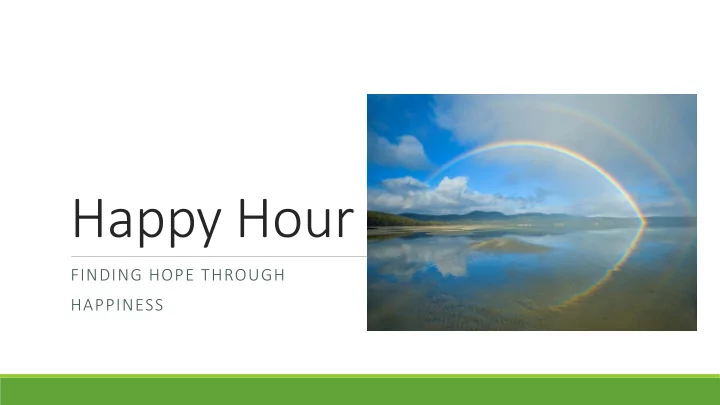

Happy Hour FINDING HOPE THROUGH HAPPINESS
Welcome and Gratitude Activity
Gratitude Scavenger Hunt Find something (an item) in your house for which you are grateful and brings you joy Put into the polling what you have found, let’s see if we can find all the items as a team!
Scavenger Hunt List * photo of person * phone or electronic device * photo of place * jewelry * stuffed animal or toy * book or other reading material * comfort item, like a blanket or pillow * toilet paper * food or beverage * musical item * real pet * something from nature (flower, plant, rock) * religious item * artwork or personal crafts * item of clothing * cards, letters, mementos, or other memorabilia
Getting through this using what we know Happiness is a skill that can be learned
It’s going to be okay… we’ll figure it out
Things That DO Impact Happiness Relationships Purpose and Meaning - Ikigai Gratitude Service and Altruism Fun Being Outside/Nature “Do Nothing” Time Creativity and Flow Spirituality and personal belief systems
The search for meaning Perspectives in thinking about happiness Are these two different areas compatible? ◦ Even (or especially) during a pandemic?? Hedonia – pleasure seeking What do we owe ourselves? Eudiamonia – meaning seeking What do we owe each other?
Science of Altruism Many studies have indicated benefits Improves our happiness and well being Enhances connection ◦ Personal relationships ◦ Community at large Altruism is not self-sacrifice, rather a mutually beneficial arrangement ◦ Personal boundaries and happiness ◦ Phoebe’s any selfless acts dilemma
Science of Altruism STUDY #1 STUDY #2 Buy yourself something or buy something for Spend a day on self-care activities or spend someone else day volunteering Results: Results: ◦ Greater happiness from buying for others ◦ Work that needed done, but no interaction ◦ Thinking of what they would like/need enhanced ◦ Self-Care activities happiness ◦ Volunteering, but in ways that there was ◦ Making others happy also made them feel happy interaction ◦ With intended recipients ◦ Part of a group working together
What is Joy? Biological perspective Definitions Joy in every day life https://www.youtube.com/watch?v=UctRZ91m9X A
Empathetic Joy
Experiencing joy in the world around us
Shape and Texture
Colors
Symmetry and balance
Spaciousness
Intentionality – making a choice to see Joy
Individual vs Relational Joy
What is Empathetic Joy? Empathetic Joy - Joining in the JOY Sharing the positive or joyful experience of another person. In Buddhism ( mudita) , is typically defined as delight in others’ happiness or good fortune, it can also mean celebrating the virtues of others. *Different than Empathy Joy or Empathic Joy in that these are viewed at motivations for action - associated with altruism
Strategies for Practice Individual Practices Relational Practices *Appreciating the joyful moments of others *Watching & Noticing *Joy Journal *Expanding the Joy Three Good Things In real-time Image Gallery Thank you Story Collective Comic Corner *Planting Joy *Joy Board
Questions about Empathetic Joy Tell us a little about yourself and how you became interested in this topic Let’s talk first about Joy. What is Joy and how is it different than happiness? What is empathetic joy and how is it different than how we think about joy typically? Talk some about the difference between sympathy and empathy? How is it experienced differently when we talk about different emotions? Can you talk more about how you’ve seen this play out, especially among the kids you work with? How is this applicable during a pandemic differently than it is in other times? Can you offer some strategies for the participants today to go practice empathetic joy?
What is one thing that brings up joy for you? Can you experience it? What is one thing you want to try this week in being happy with another? Spend some time experiencing what Joy feels like in your body Think about kindness, altruism, and feelings related to helping others find joy
References and more info https://www.sciencedirect.com/science/article/abs/pii/S0191886918304768? Soc Cogn Affect Neurosci. 2012 Nov; 7(8): 909 – 916. via%3Dihub Published online 2011 Dec 6. doi: 10.1093/scan/nsr073 PMCID: Personality and Individual Differences Volume 137, 15 January 2019, Pages PMC3501705 PMID: 22156723 147-156 Can we share the joy of others? Empathic neural responses to Feeling your joy helps me to bear feeling your pain: Examining associations distress vs joy between empathy for others' positive versus negative emotions and burnout Daniella Perry, Talma Hendler,and Simone G. Shamay-Tsoory Michael R.Andreychik https://www.smithsonianmag.com/science-nature/do-our-brains-find-certain- shapes-more-attractive-than-others-180947692/ https://www.lionsroar.com/how-to-practice-sympathetic-joy/ Social and Personality Psychology Compass 9/2 (2015): 57 – 68, 10.1111/spc3.12157 Journal of Social Issues, Vol. 72, No. 3, 2016, pp. 511--523 doi: The Emerging Study of Positive Empathy 10.1111/josi.12179 Sylvia A. Morelli, Matthew D. Lieberman, and Jamil Zaki Empathic Joy in Positive Intergroup Relations Todd L. Pittinsky ∗ Stony Brook University R. Matthew Montoya University of Dayton Stanford University, University of California, Los Angeles
Recommend
More recommend